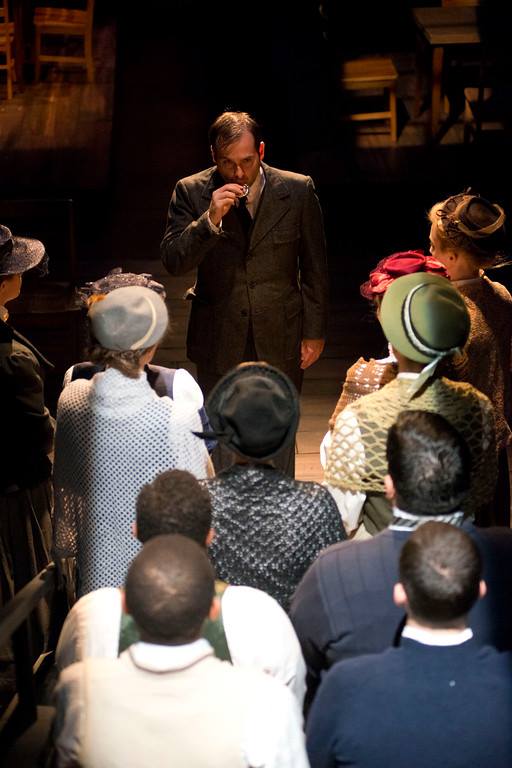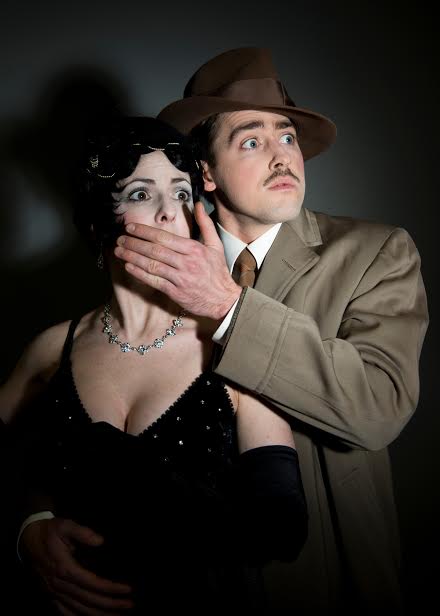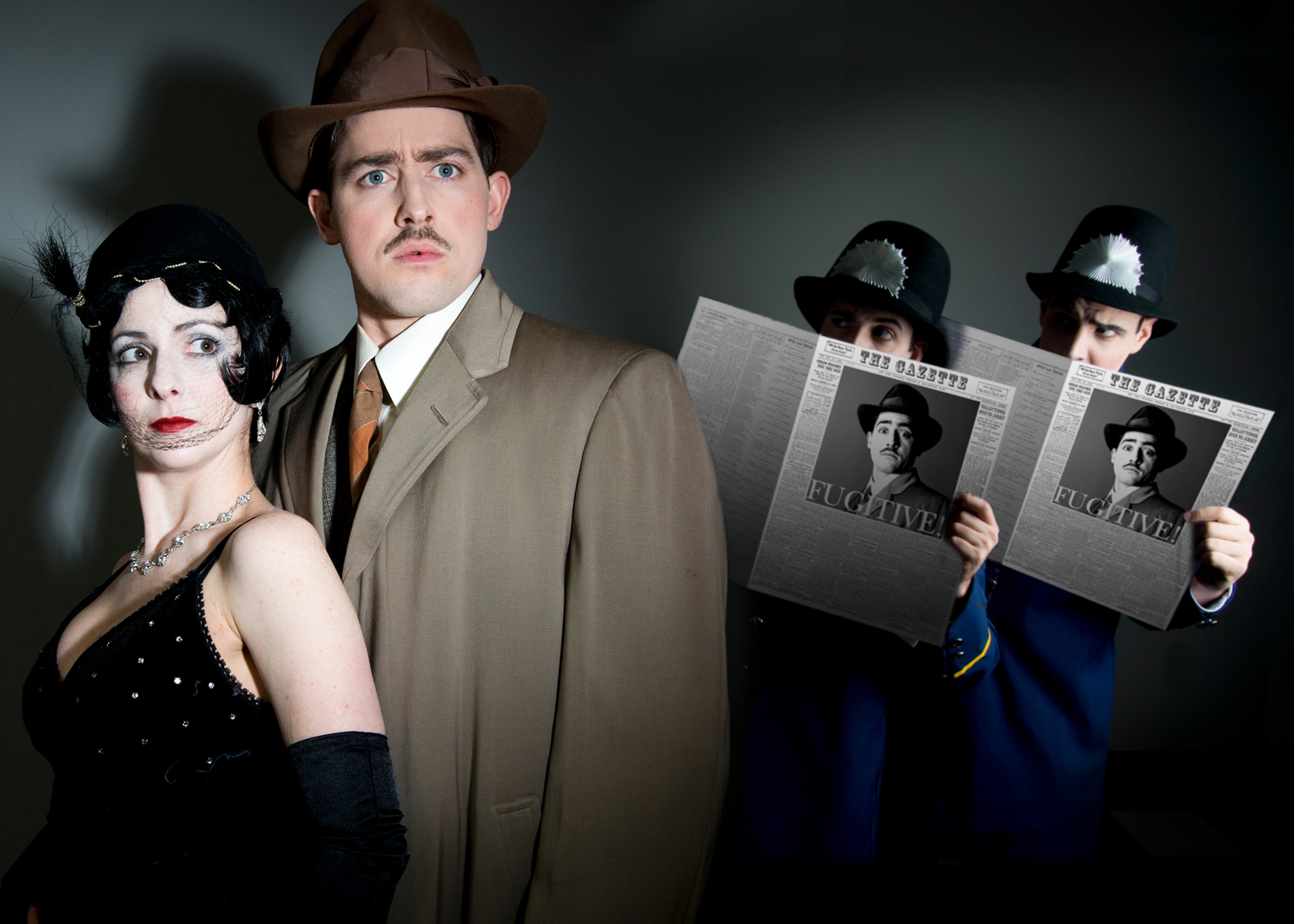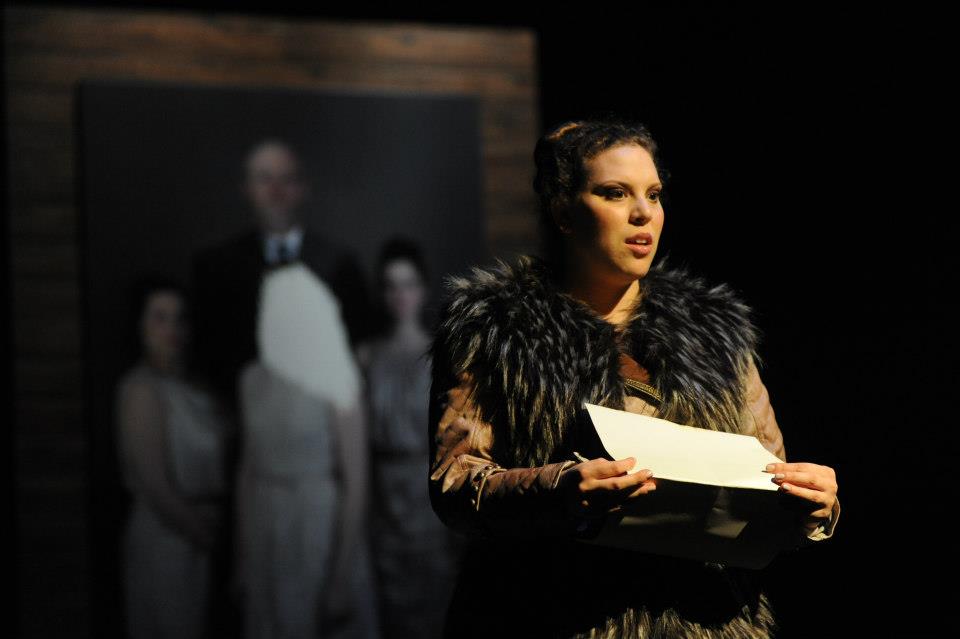Theatre South Carolina will stage Shakespeare's revered tragedy King Lear, the epic tale of a ruler's loss of power and descent into madness, April 19-27 at USC's Drayton Hall Theatre. Continuing a tradition of reinventing the "look" of classic plays to augment their timlessness and relevance to modern audiences, guest director Cristian Hadji-Culea (Director General of the National Theatre of Iasi, Romania) and Obie Award-winning scenic designer and USC professor Nic Uluru depict Lear as the head of a major corporation, who finds his immense power and sense of entitlement challenged when his authority is usurped by two of his daughters. Joining a cast of USC undergraduate and graduate theatre students are guest artists Terry Snead, Park Bucker, Paul Kaufmann, and, in the title role, professional actor James Keegan, who has worked with the Folger Shaksepeare Theatre in Wshington, DC, and the Blackfriars Playhouse at the American Shakespeare Center in Virginia. Mr. Keegan graciously took time to share some thoughts on this challenging role and production.
Jasper : How did you become involved in this production of King Lear, at USC?
James Keegan: I recently worked with Robert Richmond, a theater professor here at USC, on a production of Shakespeare’s Henry V at The Folger Shakespeare Theatre in Washington, DC; Gary Logan, who directed a production here at USC last year served as dialect coach for that production. Gary is the head of the Academy of Classical Acting MFA program at The George Washington University; both my son and daughter-in-law took their MFA degrees at that program, where they were fortunate to have Gary as a teacher, mentor, and friend. The last time I played the title role in King Lear was in 2009 at The American Shakespeare Center; in that production my son, Thomas, played Burgundy and the Doctor, and my later-to-be daughter-in-law, Alyssa Wilmoth-Keegan, played Cordelia. I suspect Gary had heard about the production from Tom and Alyssa, so that when Robert Richmond asked Gary if he knew of an actor who might play Lear in the USC production, Gary felt he knew enough to recommend me. I like to think that my work with Robert also helped to convince him I might do the job well. As all these crossovers suggest, the classical theatre world is a small one, and in this case—as in others—that has worked to my advantage.
Jasper : Often an actor will bring some new insight or perspective to a role that he or she has played before. Anything in particular that you are anticipating in playing Lear this time around?
Keegan: When I last played Lear, my father had already passed away at the age of 86—in his waning years, I had watched him become physically compromised by a stroke, and that experience was certainly part of my 2009 performance. Since that time, my mother too has died, experiencing some dementia in the final year of her life, and I have lost other older friends, including a great teacher and mentor, the poet W.D. Snodgrass, who was a lion of a man, but who also had one of the most tender and generous hearts it has been my privilege to encounter. I like to think that the best of "De" is part of my Lear.
Also, the last time I played Lear, it was in a production that was set in the medieval era, and this time around the setting is contemporary and corporate. I should note, however, that our director, Cristian Hadji-Culea, wants also to keep a sense that the world of the play is timeless, so there will be some anachronistic elements thrown in—for instance, it is planned that in an early scene in which I am dressed in a business suit, I will also be wearing a hawking glove (something from the old aristocratic world) on one hand. Also, the cut of the play is different; Cristian seems to want to emphasize a more modern philosophical world for the play. In Shakespeare’s original conception, the play is pre-Christian, and therefore there are many references to the gods as a power; in the contemporary setting, those references seem out-of-place, and therefore they are largely cut, or viewed as performative and ironic.
Finally, new director, new cast mates, that’s the excitement always—seeing what other actors will bring to the stage and within what concepts and structures I will be challenged to bring to life the character. I want to learn and be shown what I didn’t know about the character and about the play and about myself.
Jasper : Lear is one of the great tragic roles – recently you also played Pistol, a memorable but smaller role in Henry V. Actors in college chomp at the bit to get the primo roles, but so often professional performers who have been around for a while have no problem doing supporting roles, whether for the challenge of creating a character with less material, or to be part of a good ensemble doing good work, or just to have a break from so much time on stage. Any thoughts on this?
Keegan: I suppose I should quote the old adage that there are no small roles, only small actors, but there are roles that are so small that, at this stage in my life and career, I would not take them. The decision to accept a contract is a combination of some of the things you have mentioned: a great role (whether lead or featured—Pistol is a marvelous character in Henry V and the play’s representative, with Fluellen, of the common man at war); a fine ensemble of actors; an effective and collaborative director; a theater where one enjoys working or where one has long wished to work.
Playing Pistol, for instance, I never thought of the role as small because the character is clearly so important to Shakespeare, for he draws him so lovingly and so fully. Pistol is a braggart soldier and therefore he may be called a stereotypical character, but Shakespeare sets him down inside an actual military campaign, where we see his cowardice, his hopes, his losses. In the production I just did at the Folger, the director, Robert Richmond highlighted Pistol’s narrative line, so that he became a kind of counterbalance to King Henry: the young king is victorious and rises and gains, just as Pistol is defeated, and watches his friends and his fortunes fall.
Furthermore, I have worked for thirteen seasons at The American Shakespeare Center, where the season involves five plays presented in true rotating repertory, so that a dozen actors in the company are playing all the roles in every play, ad presenting a different play every night. This means that while I may play a big role in two of the plays, I am likely to play several small roles in the other plays. For example, in the 2012 Summer and Fall seasons there, I played two big roles—Henry II in James Goldman’s The Lion in Winter, and Shylock in The Merchant of Venice, and then I played much smaller roles in the three other shows—Two Gentlemen of Verona, in which I played Antonio, who has half a scene, and Outlaw #1 (need I say more?); King John, in which I played Hubert, a beautiful but minor character, and James Gurney, who appears in half a scene and says nothing; Cymbeline, in which I played King Cymbeline, who, in spite of giving his name to the play’s title is a fairly flat and un-engaging character, and whose daughter, Imogen, is the true center of the play. Such work serves to curb the ego and to remind me of how important all the characters are to the full and effective telling of the story. And the clear and engaging telling of the story is, of course, the foremost responsibility and concern of the theater professional.

Jasper : So many of us may recall Shakespeare as a burdensome assignment from English class, yet in his day Shakespeare was about as popular a form of mass entertainment as there was (and was even looked down on by some of his peers as not being cultured enough.) Certainly the visual elements of this production will help with accessibility to modern audiences, but as an actor what challenges do you face to make the play, and the role, relevant and meaningful?
Keegan: Shakespeare’s great plays are always relevant, for they deal with the great human themes: love, ambition, family ties, leadership, responsibility, vengeance, forgiveness, redemption. I am an educator too, so I have taught Shakespeare in the classroom to my students at The University of Delaware. It is unfortunate to my mind that most American students receive their first introduction to Shakespeare in the high school classroom. Don’t mistake me, I have great respect for the high school teachers I know and work with, but Shakespeare wrote in a poetic style and in a modern English that had some usages that we do not retain (use of “thee” and “thou,” for instance), and, more importantly, Shakespeare wrote for the stage, not for the page. The language of the plays was to be accompanied with action, and most any audience member will tell you that he or she understands and remembers much more what is done (the action) than what is said (the text.)
That said, I think Lear works particularly well in a modern setting—for I think it is a fundamentally modern play. It creates a world where goodness has a rough time of it, where externals and words are valued and privileged over the spiritual and over actions. How often in our culture of the lobbyist and the sound bite do we see language abused? How often do we see individuals tried in the media? We grow cynical about our leaders, about moral rectitude, about love itself. But we are so ready to come back! Many of us are so ready to shrug off that cynicism, are so prepared—like Kent, and like Cordelia—to believe still or to believe again in the nobility and goodness of our fellows, even if it costs us everything finally. Anyway, that’s what I believe, and it seems to me that that is what Shakespeare believes in King Lear. The play always reminds me of something I read once in Miguel de Unamuno’s The Tragic Sense of Life: paraphrased, it goes something like this: if it turns out in the end that there is no God, we should live in such a way that that will have been an injustice. The play reminds us that we must “see feelingly” if we have any hope of seeing the truth of ourselves, and that we must “speak what we feel, not what we ought to say,” if we have any hope of having fruitful community with one another.
Oh, and, for the record, I have never ever wanted a break from time on stage. So far, anyway.
Jasper : The roots of Lear's motivations, and his madness, have been debated for centuries, everything from dementia to bi-polar disorder to general orneriness and stubbornness. Any hints or clues as to what we will see in this production?
Keegan: This production seems to me to lean toward the ornery and stubborn side so far. Later in the play, when Lear is abandoned by his family and stripped of his followers and wandering in the storm, that ornery and stubborn nature gets pushed to an extreme and Lear suffers a psychic break—a kind of dementia.
However, as in any dementia, he has extremely lucid moments that lead him to a deeper self-discovery and a profound understanding of the treacherous nature of valuing quantitatively as opposed to qualitatively. He has learned to make something of nothing, though at the outset of the play he could not see how to do this because he, like his counterpart Gloucester, saw only in superficial terms.
Now, Gloucester, having gone into blindness and despair, and Lear, having gone beyond the rational into the mad logic of his Fool, have achieved what they lacked in the play’s opening scenes: insight and profound knowledge of themselves and the harsh world where love still resides and where those who truly love us stick by us no matter how we may have wronged them in our blindness and in our arrogance and in our self-centered folly.

Jasper : Given that you are only in Columbia for a few weeks - what is your impression of the theatre program at USC? And have you had a chance to get a feel for the greater community, either as a place for the arts, or just as a place to live, work, and study?
Keegan: My exposure to the theatre program at USC has been fundamentally through my work with the MFA actors and some of the undergrad students in the program, and I have to say that that experience—especially with the grad students, with whom I have been working most closely--speaks well of the program as a whole. The class of MFA actors speaks well of the faculty in that whoever put these eight young artists together managed to assemble a truly supportive working group: the most impressive feature of working with James Costello, Kate Dzvonik, Trey Hobbs, Josiah Laubenstein, Cory Lipman, Melissa Peters, Laurie Roberts, and Leanna Rubin is that they genuinely seem to like, care about, and encourage one another.
I am glad to be part of their introduction to working with classical theater, and I hope to have some classroom time with them soon to discuss in greater depth some of the challenges of and techniques for working with Shakespeare and his contemporaries. I have been impressed as well to see their attention and patience in the rehearsal room. We are working with Cristian Hadji-Culea, a fine director with very clear ideas about how he views the world of the play, but also a director from a different theater culture than ours and one who has some limitations with English. They have continually worked to realize his vision of the play—I admire actors who say “Yes,” and see the challenges they are being offered not as obstacles, but as opportunities to learn and to grow. When one is working hard with emotional material, one can easily grow impatient with such challenges; what I have seen in rehearsal are actors who are willing to release ego and embrace new possibilities.
I like Columbia very much. I recently spent the afternoon in your lovely museum of art. As an undergraduate at the College of the Holy Cross in Worcester, Massachusetts, I always loved going to the Worcester Art Museum, and when I worked in Pittsburgh several years ago I was a regular visitor to the Carnegie Museum of Art near the theater where I was working. The great thing about these museums as compared to the Metropolitan in New York City, where I grew up, or the National Gallery in Washington, DC, which I visit with some frequency, is that they are what I call “afternoon” museums—smaller city museums with fine collections that you can visit over several afternoons and feel like you are getting a feel for the entire collection and the ideas of its curators. The larger museums can be overwhelming to me, and I have to limit myself to seeing only a set number of galleries or pieces on a given visit. But it is so wonderful in museums like Columbia’s to spend an afternoon and see everything that is currently on display. I also very much liked the current exhibit of Impressionist art, particularly for several Bonnard canvases—he is a favorite of mine, and one especially beautiful John Singer Sargent painting, from when the artist was 24 and just starting to make a name for himself.
I am also a runner, and although the spring has been a bit cold these past few weeks, I have availed myself of your nearby parks. I love the run along the river and canal here in the city (I have yet to see any gators though) and the trails through Sesquicentennial Park and Dreher Island Park, where I really need to get a cabin with my wife some time—it is so beautiful out there. Finally, I’ve found some pretty good sushi in town and that always makes me happy! I could definitely see myself returning were someone to ask (too subtle?)
.................................
Show times for King Lear are 8 PM Wednesdays-Fridays, 7 PM Saturdays, and 3 PM on the first Sunday. There is an additional half-price late night performance on Saturday, April 27 at 11 PM. Tickets for the production are $12 for students, $16 for USC faculty/staff, military personnel and seniors 60+, and $18 for the general public. Tickets can be purchased by calling 803-777-2551 or by visiting the Longstreet Theatre box office, which is open Monday-Friday, 12:30pm-5:30pm, beginning Friday, April 12.
For more information on King Lear or the theatre program at the University of South Carolina, please contact Kevin Bush via email at bushk@mailbox.sc.edu or by phone at (803) 777-9353.
~ August Krickel








































